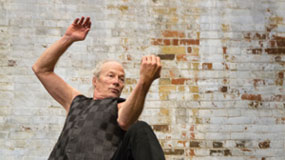
Bill James photo: Cylla von Tiedemann
Dave Grenon photo: Esther Vincent
 Entering Market Hall performance centre to see Bill James’ one-night dance performance, eidolon, the audience was met by a large stage space with a table of what seemed to be junk in one corner, and a simple table and chair set-up in the middle of the back.
Entering Market Hall performance centre to see Bill James’ one-night dance performance, eidolon, the audience was met by a large stage space with a table of what seemed to be junk in one corner, and a simple table and chair set-up in the middle of the back.
With this, director Ruth Madoc-Jones and James, as choreographer and performer created, what can only be called an experience. Mixing simplified visuals of the human body and lighting with an ethereal soundscape, the artistic endeavour used all-encompassing ambience to showcase humanity’s relationship with death.
The Greek word “eidolon” is defined in Market Hall’s description of the event as “1. an idealized person or thing. 2. a specter or phantom.” James gave the audience apparitions of the dead – melancholy, comedic, and quotidian.
Here’s the thing about interpretive dance: to me it’s most comparable to an abstract or even non-objective painting. Many people “just don’t like it” and some decry its value as art at all, but to me it works through the articulation of the grey area between our conscious and subconscious.
What we perceive is translated into meaning through subconscious associations – meaning is extracted through personal associations and self-reflexivity. In order to appreciate less realistic representations of a thing, event, or character, we must put ourselves into the work. A viewer has to open up the unconscious, let go of their inhibitions and socialized self, and access pure emotion and raw memory. Surrealism, the abstract, is most haunting because it is a reflection of ourselves.
Haunting is another word to describe eidolon. James’ physical presence and movements coupled with music by David Grenon created an atmosphere possessed by ghosts. Dealing in the half-world between the living and the dead, eidolon also raised questions of an afterlife.
The table of found objects served in creating the soundscape with additional sound effects (including frequent echoing) and dialogue clips from the ‘50s or thereabouts.
Music was created by blowing bubbles in a jug of water, to shifting fingers through coins, to a child’s toy piano, to a bow on a bike tire. The last one created both melody and discord and its creepiness will haunt my dreams. The combination of the artificial and the natural was seamless, while the echoing continued the sensation of haunting, of a soul repeating through memory.
The choice to leave the sound table within view was interesting, as it gave a simplicity and also disillusionment to the production of the music, which sometimes distracted from James’ dance. Still, it added to the spectacle and gave a sense of the mundane – a sense of accessibility but also wonder that simple objects could be turned into music, furthering on the point of the human body itself as a piece of artistry.

Lighting design by Rebecca Picherack completed the experience, James starting in a box of light that slowly spread across the stage along with his movement. The light created paths, prisons, emptiness and claustrophobia, and even what I took to be the shaft of light leading toward death itself.
The moment with the thin shaft of light going across the stage invoked constriction and confusion, a barrier between realms as James crawled towards the end of the light and would scramble back, as if in dialogue about a fear of death’s finitude.
There was also a moment where James’ shadow seemed to become a half-character. The dance of inversion, of the self as double, spoke to the constitution of (or at least how we choose to constitute) identity.
The three vignettes James presented were signalled by a sombre clang and a change of light, presenting tales of solitary and pensive struggle, loss of vitality, family life, illness, and the human being stripped down to mundanity.
The final vignette also involved James singing in Latin, which was unexpected, but fit well as a seeming dirge in the face of death’s inevitability.
It was also notable that an older, white-haired man proved to be much more agile than either myself or most of the people I know. I guess that is what you get for giving up ballet after eight years.
Luckily, I can still enjoy the things I cannot do through the astounding performances both produced in and brought through the Peterborough community.

